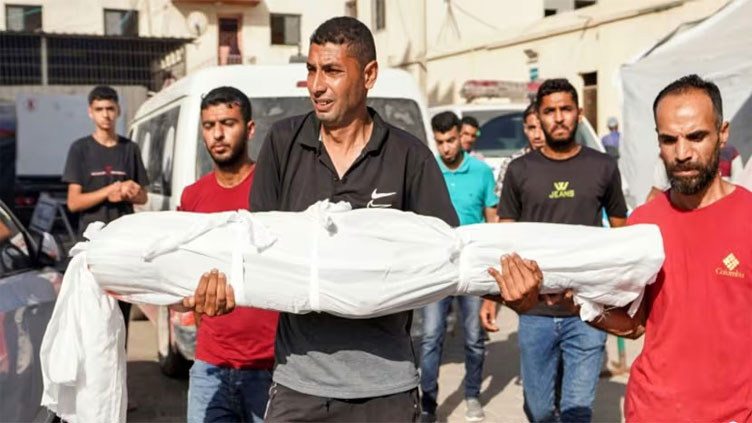Israel hits Gaza as tensions surge on Lebanon border

World
Israel's military on Friday said troops continued operations in central Gaza.
GAZA STRIP (AFP) - Israeli strikes hit Gaza on Friday as truce talks with Hamas militants failed to progress and tensions surged on Israel's northern border with Lebanon.
Witnesses reported the strikes in various parts of the Gaza Strip in the morning, particularly the centre.
At Al-Aqsa Martyrs Hospital in the central city of Deir al-Balah, men gathered over the body of an 11-year-old boy who died during bombardment of nearby Bureij refugee camp.
In a black singlet, the child lay on a floor smeared with fresh blood, a white bandage covering the top half of his face, AFP images showed.
Israel's military on Friday said troops continued operations in central Gaza, where warplanes had struck a militant cell and "military structure" in the Zeitun area.
After projectiles were fired from northern Gaza into southern Israel on Thursday night, artillery and aircraft hit the launch sites, the army said.
The war began after Hamas's unprecedented Oct 7 attack on southern Israel which resulted in the deaths of 1,194 people, mostly civilians, according to an AFP tally based on Israeli official figures.
The militants also seized 251 hostages. Of these, 116 remain in Gaza, although the army says 41 are dead.
Israel's retaliatory military offensive has left at least 37,232 people dead in Gaza, also mostly civilians, according to the health ministry in the Hamas-ruled territory.
SIRENS SOUND
Fears of a broader Middle East conflict have surged again, with Lebanon-based Hezbollah fighters, who are backed by Iran, launching waves of rockets against Israeli military targets on Wednesday and Thursday.
Hezbollah said the strikes were retaliation for the Israeli killing of one of its commanders.
Sirens sounded on Friday morning in northern Israel, where police said munitions had fallen in the Kiryat Shmona area, with no immediate sign of victims.
Since the Gaza war began, Hezbollah and Israeli forces have exchanged near-daily cross-border fire, which have escalated.
Thursday's major attack involved rockets and "squadrons of explosive-laden drones", Hezbollah said.
The Israeli army said about 40 projectiles were launched, with most intercepted, though some caused fires.
An Israeli government spokesman vowed to "respond with force to all aggressions by Hezbollah".
Later, Lebanon's National News Agency reported that Israeli "warplanes launched a raid targeting a house" in the town of Janata in Lebanon's south.
Two women were killed, village official Hassan Shur said.
French President Emmanuel Macron said on Thursday his country, the United States and Israel would work together to ease tensions in the area.
"We will do the same with the Lebanese authorities," he added, speaking at a summit of the G7 democratic group of countries.
During a Middle East trip this week to push a Gaza ceasefire proposal, US Secretary of State Antony Blinken said "the best way" to help resolve the Hezbollah-Israel violence was "a resolution of the conflict in Gaza and getting a ceasefire".
ISRAELI PROTEST
At the G7 summit in Italy, US President Joe Biden called Hamas "the biggest hang-up so far" to reaching a deal on a Gaza truce and hostage release.
Blinken has said Israel backs the plan, but Israeli Prime Minister Benjamin Netanyahu, whose far-right government allies are strongly opposed, has not publicly endorsed it.
In Jerusalem on Thursday, a student-led protest near Israel's parliament urged the government to secure an agreement to bring the remaining hostages home.
"Ceasefire now," read one banner.
Similar demonstrations have regularly occurred in Tel Aviv.
Biden's roadmap for the first truce since a week-long pause and hostage-prisoner release in November includes a six-week ceasefire, an exchange of hostages for Palestinian prisoners, and Gaza's reconstruction.
On Monday, the United Nations Security Council adopted a US-drafted resolution supporting the plan.
The World Health Organization said more than 8,000 children aged under five in Gaza had been treated for acute malnutrition.
AFP images from Al-Aqsa Martyrs Hospital showed the grieving family of a 10-year-old boy who died suffering from malnutrition. His limbs appeared thin and his ribcage was clearly visible.
"NO EID SPIRIT"
As Muslims worldwide prepare to mark Eid al-Adha starting Sunday, Gazans lamented soaring prices and shortages of essential goods - including sacrificial animals for the festival - leaving little to celebrate in the besieged territory.
"There is no Eid spirit," Mohammed Shabat, who like most of Gaza's population has been displaced by the war, said outside his tent in Deir al-Balah.
In the Israeli-occupied West Bank, Palestinian officials said an Israeli military raid killed three people in the town of Qabatiyah on Thursday. Israel's military reported it had "eliminated two wanted suspects".
The United States on Thursday condemned the Israeli finance minister's "wrongheaded" decision to redirect US$35 million in tax revenue collected on behalf of the Palestinian Authority to families of "victims of terrorism".
Economists have previously said Israel is withholding tax revenues it collects on the PA's behalf. In May, the World Bank said the PA's fiscal situation had worsened, putting it at risk of financial collapse.
The fallout from the Gaza war also escalated this week off Yemen.
Two cruise missiles launched by Yemen's Iran-backed Huthi rebels struck a bulk cargo carrier in the Gulf of Aden on Thursday, severely injuring a sailor who was evacuated by American forces, the US military said.
The Huthis said they had carried out attacks on three ships within 24 hours, including against the bulk carrier.
They are the latest Huthi strikes on shipping in the area's waterways, vital to world trade, in what they say are acts of solidarity with the Palestinians.


